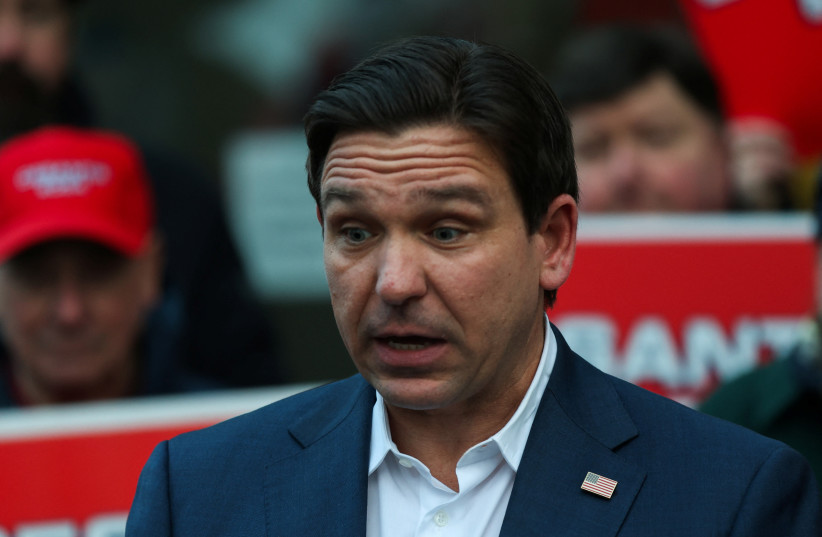Florida Gov. Ron DeSantis on Sunday said he is dropping out of the race to be the Republican candidate for president in 2024. That appeared to increase the chances that former president Donald Trump will be the GOP nominee. Of course, a lot can happen in the coming months.
What is clear, so far, is that many countries will begin to factor the possibility of a Trump victory into their policies. They will also be cognizant that the US will be focused on a tumultuous campaign season over the next 10 months. If America is focused on internal turmoil, the world could be fending for itself more this year.
During Trump’s first term, many countries struggled to figure out how to mesh with the new American president and his foreign-policy doctrines. But the Middle East was an exception. Many countries in the region were already skeptical about American leadership after the zigzag policies of the Bush and Obama years.
Other countries, such as Turkey under the AKP, sought to pursue a more muscular foreign policy after years of a “zero problems” policy. Iran used the nuclear deal as an excuse to put its proxies on steroids, charting a course after 2015 that saw it increase its influence in Iraq, Syria, Yemen, and Lebanon.
Hamas’s genocidal attack on Israel on October 7 is likely one result of the feeling among Iran and its proxies that there were no repercussions to their actions.
Trump’s first term in office appealed to some Middle East leaders
Trump’s first term in office appealed to some leaders in the Middle East who preferred a White House that had a more transactional approach to the region. Ankara, for instance, benefited from some policies that were more pro-Turkey.

Ankara was pleased to see key American official Brett McGurk leave the US administration, for instance, and they were nonplussed when he returned under Joe Biden. The Trump years in the region were bookended by the Gulf crisis between Qatar and other Gulf states, as well as the Abraham Accords, which brought an unprecedented series of new peace deals for Israel.
The Biden years, by contrast, have been underpinned by a US policy that is supposed to spread the word that “America is back.” This means that the US is now supporting democracies around the world and confronting some authoritarians in line with a kind of JFK-era kind of policy of “support any friend” and defending Western values. But there are contradictions here.
When it comes to the Middle East, three US administrations have tried to extricate themselves from the region. But they failed.
Barack Obama tried to leave Iraq and Afghanistan, only to send troops back to fight ISIS. Trump tried to leave Syria, even as Iran was entrenched there. Biden wanted to pivot to “near-peer” adversaries, only to be drawn back into the region after the Hamas massacre and the Houthi attacks on shipping.
The question that regional leaders will begin to ask now is what might come of US policy over the next year. So far, media in the Gulf have been circumspect, with no major articles yet about what DeSantis’s decision means for the region. But regional leaders don’t always say what they are thinking.
A good example is the China-brokered Saudi-Iran deal, which was not leaked before it happened. There are also many trends afoot in the region, such as the Arab League welcoming the Assad regime back into its fold. There is also a rising crisis in Sudan, which is largely ignored by the world but nevertheless affects the region.
Meanwhile, the Hamas attack has also become an inflection point and has revealed that some countries in the region, such as Qatar and Turkey, continue to host Hamas leaders, and Russia and China did not condemn Hamas. It also appears that Russia and China are benefiting from the Houthi attacks, as their ships are not being targeted.
Regional media are also messaging about Saudi-Israel peace. Saudi Arabia-based English-language newspaper Arab News reported about how Saudi Foreign Minister Prince Faisal bin Farhan had discussed the importance of resolving the Palestinian issue via a Palestinian state, which could lead to Israeli normalization with Riyadh.
Saudi Arabia has long had a proposal along these lines, so it isn’t exactly new. But Riyadh may now shift some calculations if it believes Trump is returning to office. Ankara may also shift its policies in Syria to be more aggressive in its strikes on eastern Syria. In addition, Russia’s war in Ukraine looms in the background of the region.
It appears that Moscow, for instance, did not condemn the Hamas attack, in part, because the distraction from its war in Ukraine was a welcome reprieve, with many issues up in the air.
Israel’s politics could also be affected by the US election, and its calculations about the Gaza war timetable may be altered.
It’s important to understand that US domestic politics has global ramifications, and many countries will be watching the GOP carefully to see what happens.
